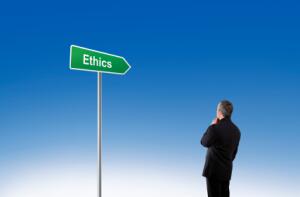7 Things to Know Before You Report a Colleague to the State Bar

Say you’re in a case and a lawyer on the other side is doing something ethically questionable.
Should you:
- Call the State Bar?
- Take the lawyer aside and – politely and professionally – request a change in behavior?
- Take the lawyer aside and – threateningly and menacingly – demand a change in behavior?
- Do nothing?
The correct answer: it depends.
Option (C) is the wrong move in any circumstance. In fact, threatening to sic the police or the State Bar on a colleague – if done solely to gain advantage in a civil matter – is an ethical violation in itself.
All the other options might be correct, depending on the facts of the situation.
Rule 8.3 Reporting Professional Misconduct
Ours is a self-regulating profession. That means we have a responsibility to report a violation of the Rules of Professional Conduct when we see it. This duty is set out in Rule 8.3 (Maintaining the Integrity of the Profession).
But there’s a catch. Not every violation has to be reported. Only those that “raise a substantial question as to that lawyer’s honesty, trustworthiness or fitness as a lawyer” warrant a call to the State Bar.
Some behavior – stealing money from the trust account, for instance – obviously must be reported. Other types of shady conduct falls into a subjective, gray area.
“A measure of judgment is, therefore, required in complying with the provisions of this Rule. The term ‘substantial’ refers to the seriousness of the possible offense and not the quantum of evidence of which the lawyer is aware. A report should be made to the North Carolina State Bar unless some other agency or court is more appropriate in the circumstances. Similar considerations apply to the reporting of judicial misconduct.”
The bottom line: Is the offense something that, if true, makes the attorney unfit to practice law? If not, then you don’t have to report.
Pointers on Reporting Bad Behavior
- Judges are held to the same standard. Judicial misconduct that “raises a substantial question as to the judge’s fitness for office” must be reported to the North Carolina Judicial Standards Commission or “other appropriate authority.”
- Consider the victim. “Reporting a violation is especially important where the victim is unlikely to discover the offense,” says Comment 1 to Rule 8.3.
- Talk to the judge. Although the State Bar is always an appropriate place to report an ethical violation, the courts have concurrent jurisdiction over the conduct of the lawyers who appear before them. Therefore, a duty to report may be satisfied by reporting the misconduct to the presiding judge. The court’s authority to impose discipline on a lawyer found to have engaged in misconduct extends beyond the usual sanctions imposed in an order entered pursuant to Rule 11 of the N.C. Rules of Civil Procedure.
- Client confidentiality is paramount. Misconduct does not have to be reported if it would violate Rule 1.6 (client confidentiality). However, you can encourage clients to consent to disclosure if their interests won’t be substantially prejudiced.
- Don’t cry wolf. Several rules prohibit unfounded Bar complaints. Rule 3.1 prohibits an attorney from bringing a frivolous proceeding. Rule 4.1 requires truthfulness in dealing with others, while Rule 4.4 bars conduct that has “no substantial purpose other than to embarrass, delay, or burden a third person.” Rule 8.4 prohibits conduct involving dishonesty, fraud, deceit or misrepresentation” and conduct prejudicial to the administration of justice. Each of these rules can be interpreted to bar unsupported allegations of attorney misconduct.
- What exactly is a “threat?” It is not always easy to tell when someone is making an actual threat to report a colleague to the Bar. Is an allusion to potential criminal or ethical consequences a threat? What about a final, stop-or-else warning? Most jurisdictions make these determinations on a case-by-case basis.
- Check yourself before you wreck yourself. Rude behavior and frustrating tactics are not always unethical. Thicken your skin. Don’t take things personally. Take a deep breath and count to 10 before you pick up the phone to call the ethics police.
What do you do when faced with offensive conduct from an adversary? We’d love to hear your tips for handling such situations.
Correction: An earlier version of this story stated that "Option (B)" was the wrong choice.
Sources:
- NC State Bar http://www.ncbar.com/rules/rules.asp
- Professional Liability Matters http://professionalliabilitymatters.com/2014/11/19/when-and-how-to-report-ethics-violations/
Jay Reeves a/k/a The Risk Man has practiced law in North Carolina and South Carolina. Formerly he was Legal Editor at Lawyers Weekly and Risk Manager at Lawyers Mutual. Contact him at 919-619-2441 or jay.reeves@ymail.com.




